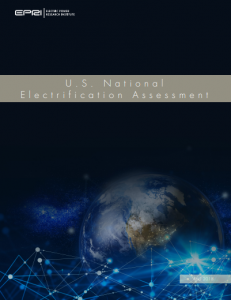Full Title: U.S. National Electrification Assessment
Author(s): Electric Power Research Institute
Publisher(s): Electric Power Research Institute
Publication Date: April 1, 2018
Full Text: Download Resource
Description (excerpt):
Electrification describes the adoption of electric end-use technologies. In developing countries, this often refers to making electric power available to customers for the first time. The value of this type of electrification is well established. In more advanced economies, including the United States, electrification increasingly describes electric end-uses displacing other commercial energy forms or providing new services such as 3-D printing and indoor agriculture. EPRI uses efficient electrification to refer to such opportunities across the economy that yield a range of efficiencies—lower cost, lower energy use, reduced air emissions and water use, improved health and safety for customer’s workers coupled with the opportunity for gains in productivity and product quality, and increased grid flexibility and efficiency.
EPRI’s Efficient Electrification Initiative explores electrification in the context of the global energy system—analyzing the customer value of advanced, end use technologies that efficiently amplify benefits of cleaner power generation. Coupling EPRI’s modeling capabilities with its extensive research on end-use technologies and grid planning and operations, the initiative is assessing inter dependent aspects of electric technologies’ adoption, electrification’s potential to enhance control and flexibility, and the impacts on grid operations and planning.
To help frame EPRI’s broad undertaking, this report highlights key findings from EPRI’s U.S. National Electrification Assessment (USNEA), which examines customer adoption of electric end-use technologies over the next three decades, along with key implications for efficiency, the environment, and the grid. The study finds that, across a range of assumptions, economy-wide electrification leads to a reduction in energy consumption, spurs steady growth in electric load, and reduces greenhouse gas (GHG) emissions—even in scenarios with no assumed climate policy. Advances in both end-use technologies and technological integration reduce costs, drive higher adoption, and amplify customer benefits. In modeling scenarios with a carbon price, the benefits from electrification are more substantial. This study also focuses attention on needed research and development and challenges for future policy and regulatory frameworks that will guide the transition.
